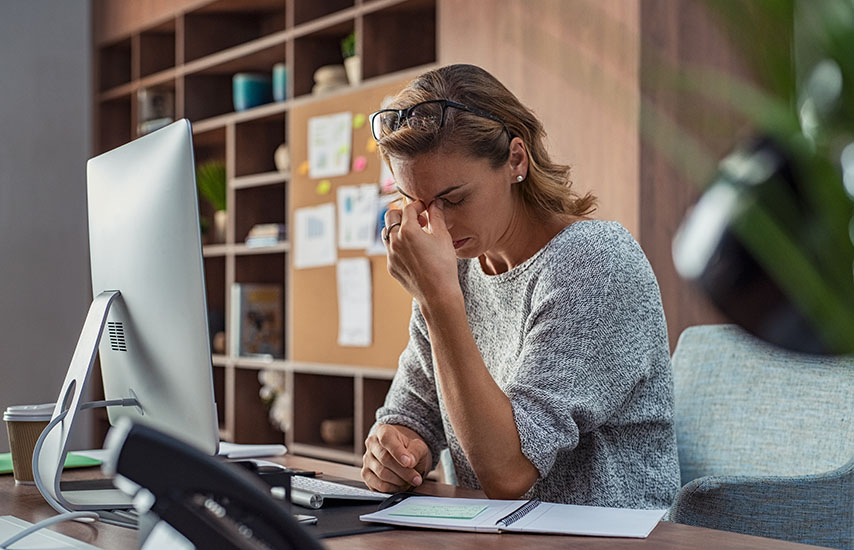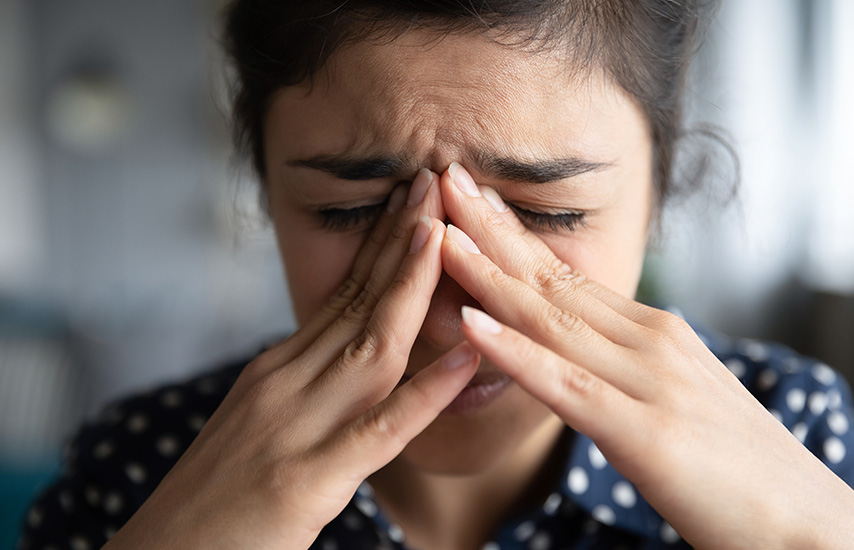The 5 Stages of Burnout: Identifying the Warning Signs

Burnout is a mental and physical state that can cause chronic fatigue.
Some people experience burnout from challenging jobs while others get it due to unresolved stress. It’s not a nice feeling to deal with, especially if you’re already struggling from emotional exhaustion.
Feeling tired and stressed can trigger physical symptoms, but there are ways to recover from this mental state. Learning about each burnout stage could prevent self-destructive behaviors and serious health problems like depression and anxiety.
Keep reading to discover the five stages of burnout and common symptoms to stay aware of.
5 Stages of Burnout: A Breakdown
Being burnt out can negatively affect your mental and physical health. Therefore, acknowledging the signs beforehand could prevent unwanted chronic stress for a prolonged period.
Here are the five stages of burnout:

Advertisement
#1 Honeymoon phase
The honeymoon phase starts with high energy and satisfaction levels. You might feel happy starting a new job since you want to do well and achieve your goals. During this stage, you should always implement coping strategies into your life to keep chronic stress away.
Some common signs of this phase include job satisfaction, high energy and productivity, optimism, and commitment to certain tasks.
At first glance, you might believe everything is well and good. However, pushing yourself too hard is what triggers burnout. Take things one step at a time to prevent self-destructive behavior or feelings of sadness when life becomes stressful.
#2 Onset of stress
Stress will slowly creep up and pounce when you least expect it. This second phase does exactly that by gradually draining your motivation. You might still be determined, but some days are more difficult than others.
People find that their optimism wanes over time. Simple things, like yawning often and neglecting personal needs, are strong indicators that you’re experiencing stress.
It’s important to know that stress can worsen anxiety and depression symptoms. One day, you could feel relatively fine, while the next brings extreme fatigue and mood swings. Forgetfulness, irritability, high blood pressure, procrastination, and lower productivity are other common signs.
A study found that stress also damages your physical health. For example, those with hypertension might get chronic headaches, chest pain, and heart palpitations. Avoiding this early on can save your physical and mental state.
#3 Chronic stress
Chronic stress happens more frequently throughout the week. This is when you begin to notice how you’re really feeling. Your stress levels are high, which means you struggle to focus properly in your everyday life.
Most people experience chronic workplace stress due to completing too many tasks or doing the same thing repeatedly. It’s all down to a failed work-life balance that doesn’t give the person time to breathe.
You might feel aggressive, depressed, panicked, and anxious. It’s also possible to get physically ill because your body is so rundown. For those who reach this stage, their jobs begin to suffer when procrastination and lateness become a regular occurrence.
Instead of pushing stress aside, find techniques that improve your mental health. You could go for morning walks before work, connect with friends, or practice meditation. Studies show that ignoring chronic stress can lead to long-term heart problems.

#4 Burnout phase
Burnout symptoms become more apparent in stage four. This is when your physical and mental state suffers the most, which creates negative behavioral changes. Everyone reaches a certain limit that sends them over the edge.
It could be that you’ve taken on too many responsibilities or can’t escape working hours. On some days, it might feel tempting to skip your job and stay in bed. Not only does your health suffer, but social relationships and careers do too.
Common burnout symptoms include feeling like a failure, experiencing migraines, chest pain, pessimistic behavior, self-doubt, stomach issues, and complete neglect of personal needs. No matter how much you continue, these feelings seem to worsen.
You should always seek professional help if you’re struggling with your mental health.
#5 Habitual burnout
Being the final stage, habitual burnout is very dangerous for your overall health. This means that the repercussions of burnout have influenced your behavior and mindset. Family and friends can’t pull you out of this state or even offer support.
Most people call this phase burnout syndrome because you’re stuck in a vicious cycle. It leads to chronic mental fatigue, physical illness, and depression.
A study found that those experiencing burnout may get suicidal thoughts. This is why stress prevention is important since you want to avoid social isolation or the urge to harm yourself.
Speak to a therapist or doctor about how you’re currently feeling. They can offer more support when it comes to identifying your own needs and reducing physical symptoms of burnout syndrome.

What Is Burnout?
Burnout is a state of physical and mental exhaustion that can take a toll on your mind. It usually stems from an occupational phenomenon. People who work more hours constantly or spend time judging themselves in a job can feel burnt out very quickly.
Feeling burnt out happens when you’re overwhelmed or stressed. Ignoring the signs can worsen your mental health and cause issues down the line. Burnout isn’t medically diagnosed, but doctors can help you determine which factors are making you feel depressed and anxious.
Those who push this feeling aside often face lower productivity levels and hopelessness. In extreme cases, people turn to alcohol and drugs to mask the inner pain. This leaves room for paranoid thoughts, which completely block the process of healing and eliminating burnout.
What Are the Burnout Symptoms?
Common symptoms of burnout include fatigue, sadness, anger, insomnia, frequent headaches, high blood pressure, and chronic stress. Those who experience work-related burnout might have lower energy levels because they’re working longer hours.
Burnout is different for everyone and may show unique symptoms depending on the individual. People who feel more stress at work could experience chronic fatigue while others with depression or anxiety might feel hopeless, irritable, unsociable, and emotionally exhausted.
You should be aware that burnout is both physical and mental. This is why your overall health suffers because you’re more likely to neglect your own needs. Not treating burnout may lead to complete shut-down or repeated panic attacks that stop you from navigating your daily life.
Am I Burnt Out?
If you feel exhausted and mentally drained, you’re most likely burnt out. A common symptom is chronic fatigue, which completely strips away your energy. Practice self-care techniques to prevent burnout from worsening and damaging your mental health.
The early stages of burnout can be very obvious. You feel more tired than usual and everything around you feels annoying. There are nights you struggle to sleep and overcome procrastination, leading to emotional exhaustion over the next few days or weeks.
Over time, you will distance yourself from co-workers because a social life feels challenging. It could be that you’re anxious and unmotivated to get out of bed. All of these negative habits build up during burnout and make you more inclined to avoid people and leave tasks uncompleted.
For those who are currently suffering from burnout, it’s important to seek support. It might seem unnecessary when all you want to do is be alone, but self-isolation isn’t good for your health. Instead, reach out to family members and close friends or book an appointment with a therapist.
How to Recover from Burnout?
Recovering from burnout requires getting restful sleep, spending time with loved ones, eating healthy food, and practicing morning meditation. There are many ways to improve mental health since it depends on your schedule, personal interests, and current mood.
Burnout recovery is important for protecting your overall wellness. It might feel like a challenging step, but you’ll thank yourself for putting in the effort. Most people focus on getting better sleep at night by avoiding afternoon naps and listening to relaxing music a few minutes before bed.
A study also found that social connection can improve your mood significantly. This could prevent feelings of loneliness and encourage you to open up about how you’re feeling. Connect with a family member you trust or make plans with close friends to get you out of the house.
Setting boundaries is a great way of preventing burnout as well. Identify your priorities so you don’t take on too many tasks or feel overwhelmed at work. Also, take time off when you need it most, as pushing yourself too far can encourage burnout and make you mentally exhausted.
A Word from a Psychologist
Burnout will negatively affect your overall well-being in a matter of days. Some people can go from being energetic to completely fatigued within 24 hours as well. This mental state is something you should take seriously to prevent unwanted stress and negative thoughts.
Going through mental exhaustion is tough, but it shouldn’t be a long-term problem. It’s important to recover your health and take necessary steps to avoid burnout in the future. Those who have successfully managed their stress can meet work deadlines without becoming overwhelmed.
Always seek professional help if you can’t overcome burnout. You could arrange therapist appointments to openly speak about your struggles. If this isn’t something you’re comfortable with, make plans with close friends or be honest with your boss about how you currently feel.
Conclusion
Burnout is common for those in stressful environments. If left untreated, your physical and mental symptoms can worsen over time. You should always be aware of the early signs if you want to prevent burnout and maintain good mental health.
Remember to seek help from a medical professional if you’re struggling. Never feel like you have to go through the stress alone.







Comments (0)